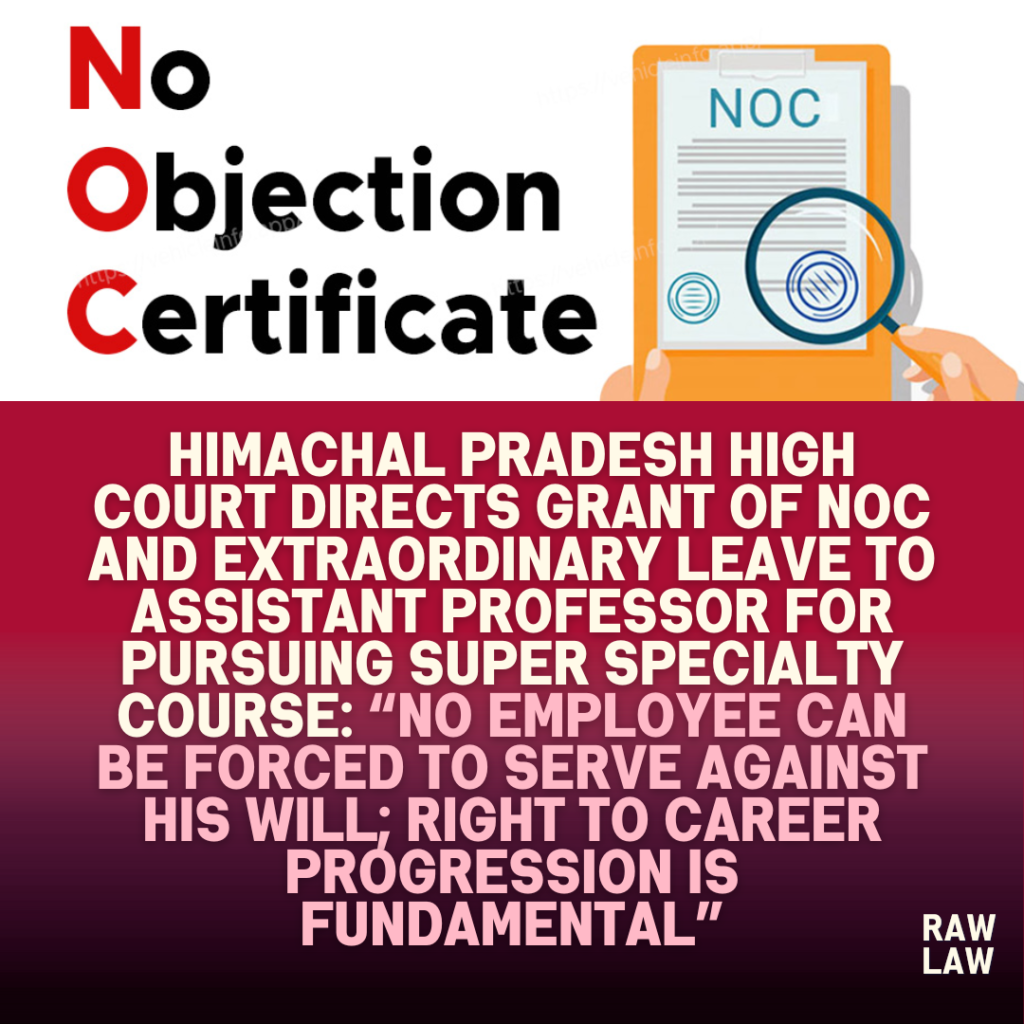Judgment: Sanjay Kumar v. State of Himachal Pradesh
Court: Himachal Pradesh High Court
Bench: Justice Jyotsna Rewal Dua
Date: 18 June 2025
Court’s Decision
The Himachal Pradesh High Court directed the State to immediately grant a No Objection Certificate (NOC) and sanction extraordinary leave without pay to the petitioner for pursuing a 3-year DNB-SS Cardiology course. The Court held that the petitioner must furnish an undertaking to serve the State as a Super Specialist for 5 years post-completion of the course. The Court further ordered the return of the petitioner’s original MBBS degree and listed the matter for compliance on 30 June 2025.
Facts
The petitioner, serving as an Assistant Professor in General Medicine at a government medical college, appeared for the NEET Super Specialty Entrance Examination held on 29 March 2025. He secured an All-India quota seat in the DNB-SS Cardiology course. He applied for an NOC from the State on 12 June 2025. Upon receiving no response, he submitted his resignation on 14 June 2025 due to the 19 June 2025 deadline for completing formalities.
Despite citing precedents of similarly placed individuals who were granted NOC or had their resignations accepted, the petitioner’s request was rejected on 17 June 2025 on the grounds of institutional and public interest. The petitioner filed a writ petition challenging this rejection and sought either NOC and extraordinary leave or acceptance of his resignation.
Issues
- Whether the State can deny an NOC or acceptance of resignation citing institutional shortfall and public interest.
- Whether a government employee has the right to resign or pursue further studies without coercion from the State.
Petitioner’s Arguments
The petitioner argued that the delay and subsequent rejection of his request was arbitrary, particularly when the State had accepted resignations or granted NOCs to other similarly situated individuals. Relying on judgments in Deepanshu Dhiman, Ajay Kumar Chauhan, and Dr. Trilok Chand, the petitioner submitted that institutional shortage cannot be a ground to deny an individual’s right to progress in his career. He was willing to submit an undertaking to serve the State for 5 years post his course.
Respondent’s Arguments
The State initially justified the rejection of the NOC and resignation on the grounds of staffing shortfalls and broader public interest, especially at the Chamba Medical College. However, after being directed by the Court to consider the petitioner’s proposal, the respondents agreed to grant the NOC and extraordinary leave subject to a written undertaking.
Analysis of the Law
The Court emphasized that the right to career advancement is a fundamental aspect of an individual’s professional autonomy. The refusal of NOC or resignation based solely on institutional staffing issues is insufficient to override such rights, especially when there is no service bond preventing exit. The Court reiterated that employees cannot be held back against their will when viable administrative alternatives exist.
Precedent Analysis
- Deepanshu Dhiman v. State of H.P. (CWP No.4319/2025) – The Court quashed rejection of resignation and held that employees have a right to progress, and State shortage cannot curtail this.
- Ajay Kumar Chauhan v. State of H.P. (LPA No.450/2024) – Reiterated that an unwilling employee cannot be forced to serve due to administrative shortfall.
- Dr. Trilok Chand v. UOI (LPA No.25/2025) – Denial of NOC on grounds of faculty shortfall was rejected; autonomy of employee upheld.
- Dr. Pankaj Sharma v. State of H.P. (CWP No.9235/2025) – The Court permitted NOC upon a financial undertaking and future service commitment, recognizing the broader benefit of trained specialists.
These precedents reinforced the view that individual rights to professional growth must be respected, and that public institutions must adapt administratively rather than restrict such rights.
Court’s Reasoning
The Court held that:
“No employee can be forced to serve against his will. Once there is no service bond, the State has no legal right to reject a resignation or withhold NOC.”
Considering the precedents and petitioner’s willingness to undertake future service, the Court found the rejection unreasonable. The State’s eventual agreement to accept the undertaking and issue the NOC aligned with judicial trends.
Conclusion
The writ petition was allowed. The State was directed to:
- Grant the NOC and sanction extraordinary leave without pay by 5:00 PM on 18 June 2025.
- Return the petitioner’s original MBBS degree.
- Accept a written undertaking within a week that the petitioner would serve the State for 5 years after completing the course.
- The Court warned that failure to honour the undertaking would invite penal and contempt consequences.
Implications
This judgment reiterates the fundamental right of public employees to pursue higher education or resign without being constrained by administrative excuses. It upholds judicial consistency in protecting career autonomy and clarifies that staff shortages cannot justify refusal of NOC or resignation where no legal bond exists.
Cases Referred
- Deepanshu Dhiman v. State of H.P. – Similar facts, resignation denial overturned.
- Ajay Kumar Chauhan v. State of H.P. – Right to resign upheld despite staff shortage.
- Dr. Trilok Chand v. UOI – NOC refusal held invalid.
- Dr. Pankaj Sharma v. State of H.P. – Undertaking-based permission granted for study leave.
